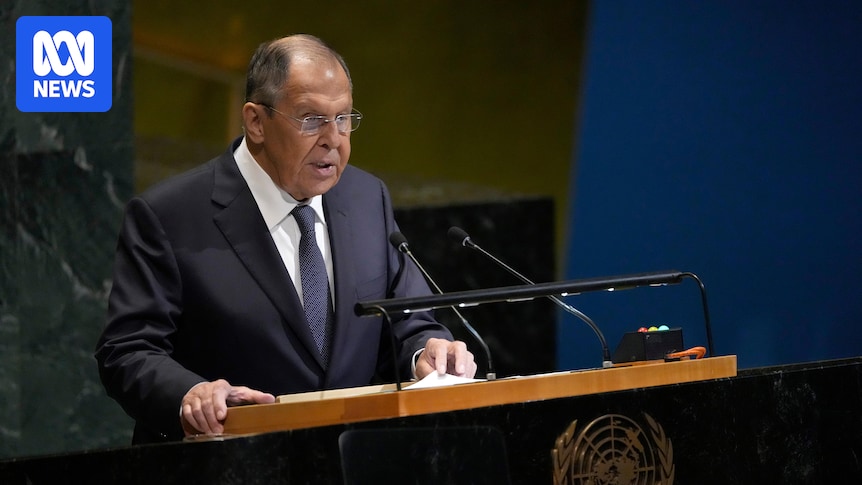
As tensions between Russia and NATO powers escalate, Russian Foreign Minister Sergey Lavrov has issued a stern warning, asserting that while Russia has no intention of attacking Europe, it will deliver a “decisive response” to any acts of aggression. Lavrov’s remarks were made during a speech at the United Nations General Assembly, following several incidents that have heightened concerns across Europe.
The backdrop to Lavrov’s comments includes a series of incursions into NATO’s airspace, which the alliance attributes to Russian actions. These incidents have included NATO jets downing drones over Poland and allegations from Estonia that Russian fighter jets intruded into its airspace for 12 minutes. Russia has denied these accusations, claiming its aircraft did not enter Estonian airspace and that the drones were not targeting Poland. Moscow’s ally, Belarus, has suggested that Ukrainian signal-jamming was responsible for the drones’ deviation.
Despite Russia’s denials, European leaders perceive these incidents as deliberate provocations designed to test NATO’s response capabilities. In response, NATO has reiterated its commitment to defending its airspace against any further breaches.
Lavrov’s Address at the UN
During his address, Lavrov emphasized that Russia is facing threats and reiterated that the nation harbors no aggressive intentions towards European or NATO countries. “Russia has never had and does not have any such intentions,” Lavrov stated. “However, any aggression against my country will be met with a decisive response. There should be no doubt about this among those in NATO and the EU.”
Lavrov’s remarks come three years into Russia’s ongoing invasion of Ukraine, a conflict widely condemned by the international community. Notably, US President Donald Trump recently expressed optimism that Ukraine could reclaim all territories lost to Russia, marking a shift from his previous stance that suggested Ukraine might need to make concessions.
US-Russia Relations and the Ukraine Conflict
Just weeks prior, Russian President Vladimir Putin indicated a “mutual understanding” with the US, following a summit in Alaska with Trump. Although the summit concluded without a resolution to the conflict, Lavrov expressed hope for continued dialogue with the US. “In the approaches of the current US administration, we see a desire not only to contribute to ways to realistically resolve the Ukrainian crisis, but also a desire to develop pragmatic cooperation without adopting an ideological stance,” Lavrov noted.
Despite these diplomatic overtures, Lavrov did not shy away from criticizing NATO and the broader Western alliance, including the European Union. Meanwhile, President Trump’s evolving perspective on Ukraine’s prospects emerged after a meeting with Ukrainian President Volodymyr Zelenskyy during the General Assembly. Zelenskyy has consistently urged global leaders to support Ukraine’s sovereignty and warned of broader implications if Russia’s aggression remains unchecked.
Russia’s Stance on Middle East Conflicts
In addition to addressing European security concerns, Lavrov also commented on the ongoing conflict in Gaza. He condemned the surprise attack by Hamas militants in southern Israel on October 7, 2023, but criticized Israel’s military response, which has resulted in significant Palestinian casualties. “There is no justification for Israel’s killing of Palestinian civilians, including children,” Lavrov stated.
According to the Gaza Health Ministry, Israel’s offensive has resulted in over 65,000 Palestinian deaths, with approximately half being women and children.
Lavrov also voiced opposition to any potential Israeli annexation of the West Bank, a move that could jeopardize the prospect of a future Palestinian state. “We are essentially dealing with an attempt at a kind of coup d’etat aimed at burying UN decisions on the creation of a Palestinian state,” he remarked.
Implications and Future Outlook
The international community has long supported a two-state solution to the Israeli-Palestinian conflict, a stance that Israeli Prime Minister Benjamin Netanyahu has rejected, arguing it would empower Hamas. As geopolitical tensions continue to simmer, the actions and rhetoric of global leaders will be closely scrutinized for their potential to either escalate or de-escalate these complex conflicts.
Looking ahead, the interplay between Russia, NATO, and the broader international community will remain a focal point in global diplomacy. The outcomes of ongoing dialogues and negotiations will likely have far-reaching consequences for regional stability and international relations.







